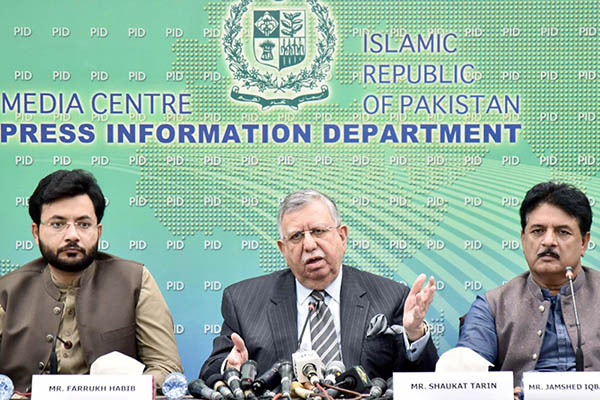
Photo courtesy PID
In press conference, Shaukat Tarin claims government will be reducing prices of essential commodities to counter rampant inflation
In a bid to avoid an “overheating” economy, Finance Minister Shaukat Tarin on Wednesday announced the government will be imposing restrictive measures to curb imports of non-essential items and restrain the growth rate to below 5 percent annually.
“It has been decided to introduce 100% cash margin requirement for imports and impose regulatory duties to curb imports of non-essential items,” he said in Islamabad at a press conference convened to address rampant inflation. The media interaction also included Special Assistant to the P.M. Jamshed Iqbal Cheema and Minister of State for Information Furrukh Habib.
According to Tarin, the government would be reducing the prices of essential commodities, including vegetable ghee, sugar and wheat, by reducing taxes and providing cash subsidies to the most impoverished segment of society.
“If measures are not taken,” he warned, “the economy could grow at more than 5% rate and we need to control the growth rate right now.” He said he wanted to avoid a situation where the economy “overheated” to a level where it caused problems for the exchange rate and balance of payments. In a bid to tamp down criticism over the government’s policies, he said global prices were at a 10-year peak right now and Pakistan could not avoid being affected by them.
Tarin’s concerns about the growth rate exceeding 5 percent are in contrast to statements he issued prior to introducing the federal budget 2021-22. During several media appearances, he had claimed that the economy could sustain growth in excess of 6 percent.
Briefing media on the measures being introduced by the government, he said regulatory duties would be imposed and 100 percent cash payments would be needed for opening letters of credit for non-essential luxury imports. He did not clarify what items constituted “non-essential luxury imports.”
New prices
The government officials reiterated their claims of petrol prices in Pakistan—despite a recent hike—being the cheapest in the region. The government has come under criticism for translating regional countries’ petrol prices through a rupee-dollar parity—the rupee is currently at a historic low against the U.S. dollar, with even the Afghan currency performing better.
Tarin said the government would be reducing taxes on edible oil to reduce its price by Rs. 45 to Rs. 50 per kg. “The government will offer direct food subsidies to 40 to 42% people on the edible items,” he said. Cheema said sugar prices would be reduced to Rs. 89.75/kg nationally, while wheat flour prices had been set at Rs. 55/kg for the general public and Rs. 43/kg for the impoverished.
On the government’s position on resuming the suspended International Monetary Fund program, Tarin admitted that electricity prices would be an issue, but “we will try to find a solution to that.” He reiterated his stance that increasing tariffs would not solve the power sector’s problems.
To a question about his election as a senator—a constitutional requirement for him to continue as finance minister after Oct. 15—Tarin said the prime minister had assured him of his election. However, no schedule has yet been issued for this process, which could require up to 23 days to complete.
On the rupee’s devaluation against the dollar, the minister attributed it to pressures resulting from higher imports, as well as dollar outflows to Afghanistan, and “perceptions” that had been “exploited” by speculators and importers.
